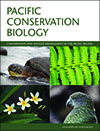Dorian Moro (Murdoch University)
Derek Ball (Island Arks Independent Consultant)
Sally Bryant (Tasmanian Land Conservancy)

Pacific Conservation Biology
Volume 28 Number 4 2022
Special IssueAction Planning for Offshore Island Conservation and Management in Australia
Australia needs a new shared vision that the current trajectory of loss of natural heritage on its offshore islands is not acceptable and needs to change. This Special Issue brings together seven papers from leaders and practitioners with experience in offshore islands across the Australian and New Zealand context. The fundamentals for each paper are to suggest potential solutions or scenarios to move forward with island policy, and management.
 , Hank Bower, Sue Bower, Peter B. Copley, Peter Dann
, Hank Bower, Sue Bower, Peter B. Copley, Peter Dann  , Darcelle Matassoni, Daniel Sprod and Duncan R. Sutherland
, Darcelle Matassoni, Daniel Sprod and Duncan R. Sutherland 
Conservation depends on people and community partnerships not only save time and money, but they also foster ownership and longevity of conservation initiatives well beyond their project timeframe. To engage island communities successfully in conservation efforts, we need to understand their motivations and embed these into program design. We present four case studies on major populated islands in Australia where community collaboration is building the collective impact needed for conservation success. They contain key learnings to help guide managers in future island planning.
 , Lorna Hudson, Janella Isaac, Tanya Vernes, Bob Muir, Terrence Whap, Melanie Dulfer-Hyams, Melinda Mclean and David Fell
, Lorna Hudson, Janella Isaac, Tanya Vernes, Bob Muir, Terrence Whap, Melanie Dulfer-Hyams, Melinda Mclean and David Fell
Earth’s islands face grave challenges. In Australia, innovation in island knowledge sharing between Traditional Owners and other island users and managers is moving beyond the participatory action planning space to generate equity in livelihoods and wellbeing on Sea Country. The tangible benefits arising are grounded in cultural governance and authority.
PC21013 Abstract | PC21013 Full Text | PC21013PDF (1.7 MB) Open Access Article
Island landscapes and component biodiversity provide invaluable services. However, these are threatened by climate change. There is currently no framework for assessing and mitigating such threats on islands. Based on an existing adaptation standard, we propose a systematic approach for planning the adaptation of islands based on a risk management process.
 , David Towns, Keith Broome, Stephen Horn, Sue Neureuter, Katina Conomos, Peter Corson, Mel Galbraith, Judy Gilbert, John Ogden and Kate Waterhouse
, David Towns, Keith Broome, Stephen Horn, Sue Neureuter, Katina Conomos, Peter Corson, Mel Galbraith, Judy Gilbert, John Ogden and Kate Waterhouse
Important technical advances have been made in eradicating invasive species and restoring biological communities on New Zealand islands. However, further developments are needed to address the important social dimensions in restoring inhabited islands and other sites. Five case studies are discussed illustrating how different social issues are being addressed.
Conservation entrepreneurship is based on the notion that it is possible to build a business system around a conservation challenge, and in doing so, create a targeted and adequate resourcing mechanism to support interventions, over adequate time frames. This paper takes the reader through the process of building such models using structures and terminologies that are commonplace in the business world, but perhaps not so much so in the conservation sector.
Australia has over 9000 islands, which are home to diverse cultures, ecosystems and biodiversity. Islands face many threats and challenges in a changing world, which are often shared across islands. Addressing these requires sharing lessons of success and failure and collaborating across islands. We propose an island platform be established to enhance coordination amongst islands. The platform would draw together practitioners, researchers, policymakers, indigenous and non-indigenous island communities to lead innovative collaborations and support Australian islands and their biodiversity conservation.
PC21062 Abstract | PC21062 Full Text | PC21062PDF (955 KB) Open Access Article
We propose a role description and an organisational model for an effective national island alliance that champions conservation action, prioritises investments aligned to risks, and connects partners at a national level. This is because a nationally coordinated approach to strategically manage Australia’s offshore islands is lacking. The creation of an ‘Australian Islands Alliance’ can form a collective of conservation practitioners across Australia’s States and Territories, partnering with island communities, and with representation across a wide spectrum of island contexts.
PC22011 Abstract | PC22011 Full Text | PC22011PDF (2.7 MB) Open Access Article